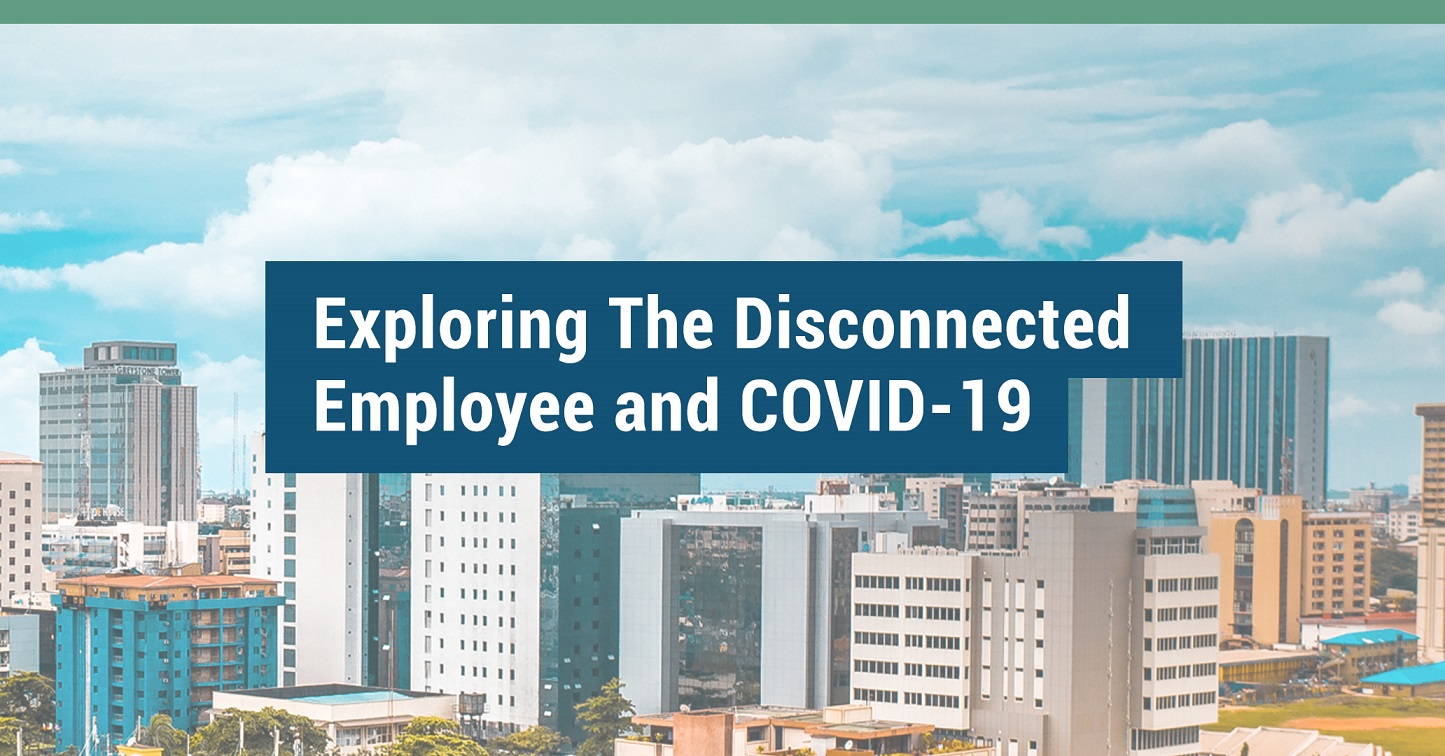Jobs/Appointments
Exploring the Disconnected Employee and COVID-19

About 97% of organisations are not addressing employees’ psychological stress. As global supply chains are disrupted, the International Monetary Fund (IMF) has predicted the worst Nigerian recession in 30 years.
Studies suggest, that areas most topical for Nigerian businesses are liquidity and lay-offs. Board rooms up and down the country are desperately trying to figure out how long the recovery will take and the impact on their cash flow.
However, a recent pcl. study indicates that the well-being of employees must also feature highly on the executive agenda.
From our experience, negative impacts on employee well-being can be protracted and long-lasting, often leading to a psychological disconnection between the employee and the organisation.
With a recession looming, if this disconnection is not tackled head-on, organisations will witness low employee productivity, resulting in a slower-than-expected business recovery in a COVID-19 new normal.
Most Business Continuity Plans (BCP) appeared to place a premium on the provision of hard infrastructure to guarantee business operations.
Therefore, even though 65% of organisations in Nigeria implemented work from home policies during the lockdown, 94% of employees were not provided with Working From Home (WFH) guidelines and best practices.
Nevertheless, WFH was a welcome development, as 65% of employees in Nigeria aimed to use the lockdown as an opportunity to enjoy time with family and pursue personal development objectives.
The question is, should organisations place more emphasis on developing the softer components of the recovery, in a bid to reinforce the psychological contract between the employer and employee?
Our experience suggests that such contracts are critical for developing employee well-being, a consequence of which is improved organisational performance through deeper business connectivity.
For example, despite the organisational focus on hard infrastructure, 60% of employees on average are experiencing electricity and internet challenges while working remotely.
Whilst higher than expected usage by employees was foreseeable, many organisations did not make financial provisions for the additional data that was consumed or provide power banks to cope with electricity fluctuations. This small but meaningful oversight was a common source of an anecdotal employee complaint.
The numbers suggest a broader challenge of organisations failing to align modern digital technologies to firm business commitments pertaining to personal development, continuous learning, cross-functional collaboration and innovation.
With 65% of employees aiming to pursue personal development objectives during the lockdown, merely 7% of organisations prioritised staff training during the lockdown, and only 16% of companies were open to virtual learning.
Furthermore, 64% of employees are still using WhatsApp as the primary business tool while WFH. However, along with standard cybersecurity concerns, as a tool for managing business communications and driving high performing teams, WhatsApp still has several limitations.
But, do the numbers identify a failure to use technology effectively or do they harbour a more profound concern which suggests that organisations are failing to grapple with anticipated seismic shifts in the ‘future of work’?
With the long-term possibility of business uncertainty and disruption in ways of working, technology aligned business objectives are critical for providing employees with the tools essential for empowerment, self-management and personal accountability.
A focus on employee well-being, i.e. team engagement, personal development, social support, and work motivation, is critical at the best of times.
But more so in a time of employee isolation, social distancing, home schooling, financial strain, housing and food insecurity, job anxiety and most importantly, the potential loss of family and loved ones.
Such pressures acutely align with the physiological needs identified by the psychologist Abraham Maslow in his paper “A Theory of Human Motivation”. If an employee is hungry, it will be hard to focus on anything other than food. Predictably, the brunt of the discomfort will fall on those in the medium to low-income bands. According to the National General Household Survey that was conducted in 2019; 32% of Nigerian households experienced food shortages.
This might explain why 41% of employees are admitting to low work motivation, and 75% are struggling with home confinement. Consequently, even though 51% of organisations claimed to possess senior management channels for employee engagement, going forward, we must consider the frequency and commitment to using those channels for discussing issues of well-being.
There are several early warning signs for identifying disconnected employees. Key performance indicators include increased absenteeism, increased number of sick days, lateness to the office, higher staff turnover, low employee engagement, and reduced productivity.
However, a considered approach to driving employee intimacy can shift corporate culture to ensure human capital remains a key lever for performance.
With the uncertainty and complexity of things to come, employee well-being must be front and centre of the recovery process for Nigerian organisations. 57% of employees are expecting wage cuts in the next 1-3 months, so, it would be foolhardy to infer that tough, unpopular decisions do not lie ahead.
But it is also worth noting that decisions that impact employee well-being will have socio-economic outcomes that extend far beyond the organisation and into the broader realms of society (The unintended consequence of change).
The ability of an organisation to remain connected with employees, strengthen the psychological contract and prioritise areas of well-being, are critical to ensuring superior performance and accelerated COVID-19 recovery. Not just for organisations, but the country as a whole.
Jobs/Appointments
Court Sanctions CHI Limited for Wrongful Employment Termination

By Modupe Gbadeyanka
The termination of the employment of one Mr Bodunrin Akinsuroju by CHI Limited has been declared as unlawful by the National Industrial Court of Nigeria.
Delivering judgment on the matter, Justice Sanda Yelwa of the Lagos Judicial Division of the court held that the sacking of Mr Akinsuroju did not comply strictly with the provisions of the contract of employment and the Employee Handbook.
Consequently, the company was directed to pay him the sum of N2 million as general damages for wrongful termination and N200,000 as costs of action, while Mr Akinsuroju was ordered to return the company’s properties in his possession or pay their assessed market value.
Justice Yelwa found that the contract agreement between both parties clearly required either party to give 30 days’ notice or payment in lieu of notice after confirmation of appointment, and there was no evidence that the employee was given the required notice or paid salary in lieu of notice.
The judge held that failure to comply with this fundamental term amounted to a breach of the contract of employment, thereby rendering the termination wrongful.
Mr Akinsuroju had claimed that the allegation of misconduct against him was unfounded and not established, maintaining that the disciplinary committee proceedings were prejudicial and that the termination of his employment was without justifiable cause and without compliance with the agreed terms of his employment.
In defence, CHI Limited contended that it had the right to terminate the employment of Mr Akinsuroju and that the termination was lawful and in accordance with the contract of employment and the Code of Conduct.
In opposition, counsel to Mr Akinsuroju submitted that the alleged breaches were not proved and that the termination letter took immediate effect without the requisite 30 days’ notice or payment in lieu of notice as stipulated in the letter of appointment and the Employee Handbook, urging the court to hold that the termination was wrongful and to grant the reliefs sought.
Jobs/Appointments
Tinubu Appoints Tunji Disu as Acting Inspector General of Police

By Modupe Gbadeyanka
President Bola Tinubu on Tuesday appointed Mr Tunji Disu as the acting Inspector General of Police (IGP), following the resignation of Mr Kayode Egbetokun.
Mr Disu, an Assistant Inspector General of Police (AIG), was recently moved to the Force Criminal Investigation Department (FCID) Annex, Alagbon, Lagos.
A statement today by the Special Adviser to the President on Information and Strategy, Mr Bayo Onanuga, disclosed that the President would convene a meeting of the Nigeria Police Council shortly to formally consider the appointment of Mr Disu as substantive IGP, after which his name will be transmitted to the Senate for confirmation.
Mr Tinubu expressed confidence that Mr Disu’s experience, operational depth, and demonstrated leadership capacity would provide steady and focused direction for the Nigeria Police Force during this critical period.
He reiterated his administration’s unwavering commitment to enhancing national security, strengthening institutional capacity, and ensuring that the Nigeria Police Force remains professional, accountable, and fully equipped to discharge its constitutional responsibilities.
Mr Egbetokun was said to have resigned from the position due to pressing family considerations.
President Tinubu, who accepted the resignation letter, expressed his profound appreciation for Mr Egbetokun’s decades of distinguished service to the Nigeria Police Force and the nation. He acknowledged his dedication, professionalism, and steadfast commitment to strengthening internal security architecture during his tenure.
Appointed in June 2023, Mr Egbetokun was serving a four-year term scheduled to conclude in June 2027, in line with the amended provisions of the Police Act.
The statement disclosed that his replacement was in view of the current security challenges confronting the nation, and acting in accordance with extant laws and legal guidance.
Jobs/Appointments
Tunji Disu to Become New IGP as Egbetokun Quits

By Adedapo Adesanya
Mr Tunji Disu, an Assistant Inspector General of Police (AIG), has reportedly replaced Mr Kayode Egbetokun as the new Inspector General of Police (IGP).
Mr Egbetokun resigned from the position on Tuesday after he was said to have held a meeting with President Bola Tinubu on Monday night at the Presidential Villa in Abuja.
President Tinubu appointed Mr Egebtokun as the 22nd IGP on June 19, 2023, with his appointment confirmed by the Nigeria Police Council on October 31, 2023.
Appointed as IGP at the age of 58, Mr Egbetokun was due for retirement on September 4, 2024, upon reaching the mandatory age of 60, but his tenure was extended by the President, creating controversies, which trailed him until his exit from the force today.
Although the police authorities are yet to comment on the matter or issue an official statement about his resignation, the move came amid reports suggesting that Mr Egbetokun has left the position.
Mr Egbetokun’s tenure was marred by a series of controversies; he recently initiated multiple charges against activist Mr Omoyele Sowore and his publication, SaharaReporters, after Mr Sowore publicly described him as an “illegal IGP.”
The dispute escalated into protracted legal battles, with the Federal High Court issuing injunctions restricting further publications relating to the former police chief and members of his family. Critics interpreted these court actions as attempts to stifle dissent and weaken press freedom.
His replacement, Mr Disu, was posted to oversee the Force Criminal Investigation Department (FCID) Annex, Alagbon, Lagos, some days ago.
-

 Feature/OPED6 years ago
Feature/OPED6 years agoDavos was Different this year
-
Travel/Tourism10 years ago
Lagos Seals Western Lodge Hotel In Ikorodu
-

 Showbiz3 years ago
Showbiz3 years agoEstranged Lover Releases Videos of Empress Njamah Bathing
-

 Banking8 years ago
Banking8 years agoSort Codes of GTBank Branches in Nigeria
-

 Economy3 years ago
Economy3 years agoSubsidy Removal: CNG at N130 Per Litre Cheaper Than Petrol—IPMAN
-

 Banking3 years ago
Banking3 years agoSort Codes of UBA Branches in Nigeria
-

 Banking3 years ago
Banking3 years agoFirst Bank Announces Planned Downtime
-

 Sports3 years ago
Sports3 years agoHighest Paid Nigerian Footballer – How Much Do Nigerian Footballers Earn












